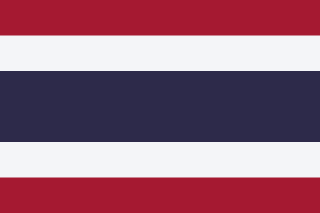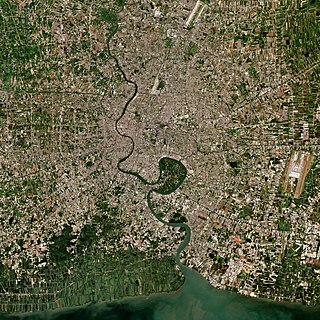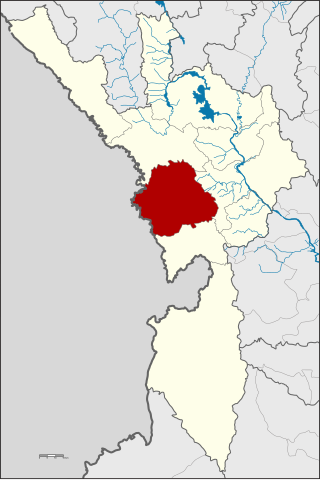Related Research Articles

Myanmar, officially the Republic of the Union of Myanmar, also known as Burma, is a country in Southeast Asia. It is the largest country by area in Mainland Southeast Asia and has a population of about 55 million. It is bordered by Bangladesh and India to its northwest, China to its northeast, Laos and Thailand to its east and southeast, and the Andaman Sea and the Bay of Bengal to its south and southwest. The country's capital city is Naypyidaw, and its largest city is Yangon.

Thailand, officially the Kingdom of Thailand and also known historically as Siam, is a country in Southeast Asia on the Indochinese Peninsula. With a population of almost 70 million, it spans 513,120 square kilometres (198,120 sq mi). Thailand is bordered to the northwest by Myanmar, to the northeast by Laos, to the southeast by Cambodia, to the south by the Gulf of Thailand and Malaysia, and to the southwest by the Andaman Sea; it also shares maritime borders with Vietnam to the southeast and Indonesia and India to the southwest. Bangkok is the nation's capital and largest city.

The demographics of Thailand paint a statistical portrait of the national population. Demography includes such measures as population density and distribution, ethnicity, educational levels, public health metrics, fertility, economic status, religious affiliation, and other characteristics of the populace.

The Shan people, also known as the Tai Long or Tai Yai, are a Tai ethnic group of Southeast Asia. The Shan are the biggest minority of Burma (Myanmar) and primarily live in the Shan State of this country, but also inhabit parts of Mandalay Region, Kachin State, Kayah State, Sagaing Region and Kayin State, and in adjacent regions of China, Laos, Assam and Meghalaya, Cambodia, Vietnam and Thailand. Though no reliable census has been taken in Burma since 1935, the Shan are estimated to number 4–6 million, with CIA Factbook giving an estimate of five million spread throughout Myanmar which is about 10% of the overall Burmese population.
Education in Thailand is provided mainly by the Thai government through the Ministry of Education from pre-school to senior high school. A free basic education of fifteen years is guaranteed by the Thai constitution.

The Bangkok Metropolitan Region (BMR), may refer to a government-defined "political definition" of the urban region surrounding the metropolis of Bangkok, or the built-up area, i.e., urban agglomeration of Bangkok, Thailand, which varies in size and shape, and gets filled in as development expands.

Mae Sot is a district in western Thailand that shares a border with Myanmar to the west. It is notable as a trade hub and for its substantial population of Burmese migrants and refugees. The town is part of Tak province and is the main gateway between Thailand and Myanmar. As a result, it has gained notoriety for its trade in gems and teak, as well as black market services such as human trafficking and drugs. Neighbouring districts are : Mae Ramat, Mueang Tak, and Phop Phra. The Moei River serves as a natural border between Mae Sot and the Burmese town of Myawaddy.

The Tamil diaspora refers to descendants of the Tamil immigrants who emigrated from their native lands in the southern Indian subcontinent to other parts of the world. They are found primarily in Malaysia, Arab states of the Persian Gulf, South Africa, North America, Western Europe, and Singapore.
According to the United States Department of State, "Thailand is a source, destination, and transit country for men, women, and children subjected to forced labour and sex trafficking." Thailand's relative prosperity attracts migrants from neighboring countries who flee conditions of poverty and, in the case of Burma, military repression. Significant illegal migration to Thailand presents traffickers with opportunities to coerce or defraud undocumented migrants into involuntary servitude or sexual exploitation. Police who investigated reaching high-profile authorities also received death threats in 2015.
Living River Siam is a Thai non-governmental organization (NGO) which analyzes the impact of Thailand's various dam projects and coordinates the research of indigenous peoples to give Thai villagers the power to document the influence of local rivers and dams. Founded in 1999, it gained prominence during the Pak Mun Dam study period in 2001, when it developed a method for instructing villagers on how to document the effects of the dammed river on their lives. When the Thai government proposed other dam sites, Living River Siam took its research methods to the villages surrounding those sites as well. Today, the organization works with other NGOs in Southeast Asia to counter government-sponsored research that encourages dam construction.
There is a small population of Burmese people in Japan. In June 2023, there were 69,613 Burmese living in Japan.
Burmese Australians are Australian citizens or permanent residents who carry full or partial ancestry from Myanmar, also known as Burma, a country located in Southeast Asia. The majority ethnic group of Burma is the Bamar people but there are also numerous Burmese ethnic minorities.
Natural Fruit Company, Ltd. (NFC), also called "Natfruit", is a Thai privately owned fruit wholesaler, specializing in pineapple. It was established on 17 March 2001 to manufacture canned pineapple and pineapple juice concentrate. The company was established with a registered capital of 84 million baht. The factory has production capacity of 400 tons of raw material per day and employs a workforce of from 500 to 800 persons. Natfruit is located in Pran Buri, Prachuap Khiri Khan Province, an area known for its pineapples.
Thailand has become one of the destinations of choice for North Korean defectors aiming to either resettle in third countries, or pass in transit to South Korea. Although the Royal Thai Government does not recognize North Korean escapees as refugees, but rather as illegal economic migrants, the Thai government allows North Koreans illegally entering the country to resettle in South Korea. This is possible because South Korea’s domestic law recognizes that North Koreans are also citizens of South Korea. The Thai government also cites the "conveniently blurred geographical distinctions" between the two Koreas in facilitating the transfer and resettlement process.

In 2015, hundreds of thousands of Rohingya people were forcibly displaced from their villages and IDP camps in Rakhine State, Myanmar, due to sectarian violence. Nearly one million fled to neighbouring Bangladesh and some travelled to Southeast Asian countries including Malaysia, Indonesia, Cambodia, Laos and Thailand by rickety boats via the waters of the Strait of Malacca, Bay of Bengal and the Andaman Sea.

Burmese in Thailand constitute Thailand's largest migrant population. According to the 2014 Myanmar Census, 1,418,472 former Burmese residents, including 812,798 men and 605,674 women, were living in Thailand, constituting about 70% of Burma's overseas population. Burmese in Thailand tend to fall into three categories: professional migrants working in the business or professional sectors, laborers working in low-skilled professions, and refugees fleeing conflict.
Korravee Pimsuk is a Thai actress and fashion model who also works in Myanmar. She is best known for her breakthrough role as Emily in the 2018 film Deception (ဥပါယ်တံမျဉ်), which propelled her to fame in Myanmar.

The Koh Tao murders involved the deaths of two British tourists in Thailand in 2014. On 15 September, the bodies of Hannah Witheridge and David Miller were found on Sairee Beach on the island of Koh Tao, between 4 and 5 am, a few hours after their deaths. Both victims had been hit several times on the head; Witheridge had been raped, and Miller had been drowned.
Thuzar Maung, sometimes spelled as Thu Zar Moung, is a Burmese refugee activist. Born into a Muslim family in Myanmar, she fled the country in 2015 following the increased persecution of Muslims there, eventually receiving refugee status in Malaysia. A supporter of the National Unity Government of Myanmar and a critic of the Tatmadaw, Thuzar Maung has also been a vocal activist for the rights of Burmese refugees and migrants living in Malaysia. On 4 July 2023, Thuzar Maung and her family were abducted by a group of unidentified men from their home in Selangor; their whereabouts remain unknown as of November 2023.
Od Sayavong is a Lao human rights and pro-democracy activist who disappeared on 26 August 2019 whilst seeking refuge in Thailand, in what has widely been reported as being an enforced disappearance. Od has not been seen since.
References
- ↑ "Discovering the ASEAN Communities right here in Bangkok". BK Magazine Online. Retrieved 3 September 2015.
- ↑ "借金をなんとかしたい". Tacdbburmese.org. Archived from the original on 10 September 2015. Retrieved 3 September 2015.
- ↑ "Bangkok Post article". Bangkok Post article. 2012-12-29. Retrieved 2015-09-04.
- ↑ "Burmanet » Bangkok Post: Studying in a permanent home". Burmanet.org. Retrieved 3 September 2015.
- ↑ "Living the dream". Tacdb-burmese.org. Retrieved 3 September 2015.
- ↑ "Living the dream, Bangkok Post - Mekong Migration Network". Mekongmigration.org. Retrieved 3 September 2015.